 Two great schooner festivals and regattas are now underway on Massachusetts’ Cape Ann and Cape Cod. On Cape Ann, the Twenty-Eighth Annual Gloucester Schooner Festival began yesterday with the arrival of the schooner fleet. Today there will be dockside events and tours of the visiting HMS Bounty. The Mayor’s Race will be sailed on Sunday with Monday held in reserve as a rain day.
Two great schooner festivals and regattas are now underway on Massachusetts’ Cape Ann and Cape Cod. On Cape Ann, the Twenty-Eighth Annual Gloucester Schooner Festival began yesterday with the arrival of the schooner fleet. Today there will be dockside events and tours of the visiting HMS Bounty. The Mayor’s Race will be sailed on Sunday with Monday held in reserve as a rain day.
Just to the south on Cape Cod, the Great Provincetown Schooner Regatta begins today and runs through Friday, September 7th. The week long festivities on land and sea include racing in and around the waters of Provincetown Harbor and the Fisherman’s Cup race, a schooner only event, which starts in Gloucester on Tuesday, September 3rd and ends in Provincetown harbor.

 The
The  Tonight’s sky will be graced by a “blue moon.” It is the first blue moon since New Year’s Eve 2009. The next blue moon won’t appear until July 2015. Tonight’s full moon won’t actually be blue for most of us. A “blue moon” is commonly defined as the second full moon in a calendar month. It doesn’t happen often and so is the inspiration for the phrase, “once in a blue moon.”
Tonight’s sky will be graced by a “blue moon.” It is the first blue moon since New Year’s Eve 2009. The next blue moon won’t appear until July 2015. Tonight’s full moon won’t actually be blue for most of us. A “blue moon” is commonly defined as the second full moon in a calendar month. It doesn’t happen often and so is the inspiration for the phrase, “once in a blue moon.”
 Tomorrow, Friday August 31 through Monday September 3, 2012, the
Tomorrow, Friday August 31 through Monday September 3, 2012, the 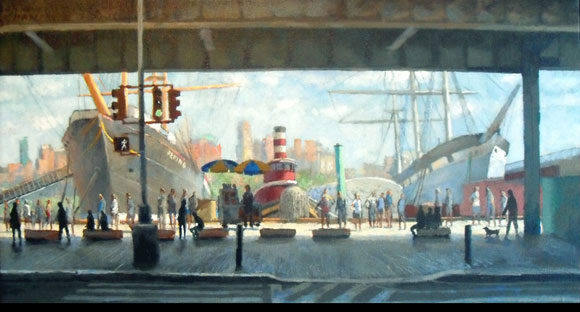 If you are near New York harbor, there is a closing party for the “Ships of New York Harbor: Marine Art of Christina Sun and Frank Hanavan” exhibit on the
If you are near New York harbor, there is a closing party for the “Ships of New York Harbor: Marine Art of Christina Sun and Frank Hanavan” exhibit on the  Last January
Last January  Today is
Today is  The old saying goes that success is the best revenge.
The old saying goes that success is the best revenge. 
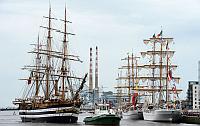
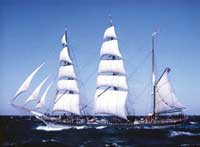 There were several recent news accounts related to the
There were several recent news accounts related to the 

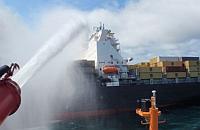 Updates to two sets of recent posts: After considerable delay the container ship
Updates to two sets of recent posts: After considerable delay the container ship 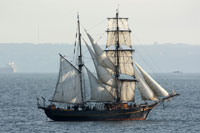 Commercial sail has not yet returned, but there are interesting niche players who are doing what they can to change that. The sailing brigantine
Commercial sail has not yet returned, but there are interesting niche players who are doing what they can to change that. The sailing brigantine  Last week it was announced that the wreck of
Last week it was announced that the wreck of